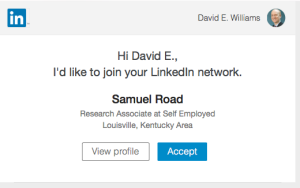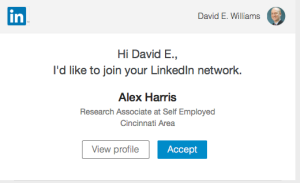Saturday, October 31, 2015
Friday, October 30, 2015
Thursday, October 29, 2015
Wednesday, October 28, 2015
Call for submissions: Health Wonk Review
I’ll be hosting the Health Wonk Review here on the Health Business Blog next week. Do you have a great post you’d like to share with a wider audience? If so, please send it along via email or use the contact form.
Deadline is Wednesday, November 4 at noon EST.
from Health Business Blog http://healthbusinessblog.com/2015/10/28/call-for-submissions-health-wonk-review-3/
via A Health Business Blog
Tuesday, October 27, 2015
Are privileged people wasting their time using healthcare portals?
A new study on use of electronic health portals by patients with chronic kidney disease is another example of telling people something we already know: people with lower socioeconomic status don’t adopt healthcare innovations to the same extent as those with higher status. In this case, white, young, married, commercially insured, higher income patients used the portal more.
Here’s what the lead author told NPR about the study:
“Despite the increasing availability of smartphones and other technologies to access the Internet, the adoption of e-health technologies does not appear to be equitable,” Abdel-Kader says. “As we feel we are advancing, we may actually perversely be reinforcing disparities that we had been making progress on.”
Presumably the portal users expected to receive some sort of benefit as a result of logging in. However, from what I can understand from the NPR story and study abstract, the researchers were unable to document the clinical benefit (better blood pressure control) that they were expecting to find.
So maybe a better conclusion is that relatively privileged people with the luxury of time and bandwidth on their hands tend to waste time and resources on a portal that doesn’t provide benefits, while those with lower status focus on more important and productive pursuits.
Ok, that conclusion may not be correct either, but I have real doubts about the usefulness of this research.
It’s ironic that the authors –while bemoaning barriers to access and arguing passionately for policies to address it– published their study and accompanying editorial behind a paywall in the Clinical Journal of the American Society of Nephrology rather than with an open access publisher such as PLOS. I’m curious about the details of the study but not enough to pay $27 for the article and another $27 to read the editorial. I’m going to spend my $54 on something better.
Image courtesy of basketman at FreeDigitalPhotos.net
—
By healthcare business consultant David E. Williams, president of Health Business Group.
from Health Business Blog http://healthbusinessblog.com/2015/10/27/are-privileged-people-wasting-their-time-using-healthcare-portals/
via A Health Business Blog
Saturday, October 24, 2015
Friday, October 23, 2015
Thursday, October 22, 2015
Health Wonk Review is up at Healthcare Economist
Boo! Healthcare Economist hosts the Halloween edition of the Health Wonk Review blog carnival. Check out all the spooky, wonky posts.
I’ll host the next edition at the Health Business Blog on November 5. So feel free to submit your entries via email or using our contact form.
from Health Business Blog http://healthbusinessblog.com/2015/10/22/health-wonk-review-is-up-at-healthcare-economist-13/
via A Health Business Blog
Wednesday, October 21, 2015
Tuesday, October 20, 2015
A wakeup call from the nanny state
My cellphone was off Friday night so I was lucky enough to miss the Amber Alert that was sent out at 1:45 am when a mom decided to drive home from Pennsylvania to have her son treated at Boston Children’s Hospital. I heard about it Saturday night from some friends who couldn’t believe this had occurred and were annoyed at being awoken. From where I sit, the only good thing about it is that it’s literally a wake-up call to the whole community about how the system treats vulnerable people.
It’s hard to say exactly what happened. But from what’s been written, it goes something like this:
- A nurse practitioner in Wilkes-Barre, PA told a mom to take her 2-month old to a nearby emergency room for treatment of severe dehydration
- Mom felt she had gotten “the runaround” from the Pennsylvania clinic and decided to drive to Boston Children’s Hospital to have her son treated there. She is from Boston and apparently has a relationship with a doctor there
- On the way back she dropped off her older son with a niece in Waltham so she could focus on the infant
- Somewhere along the way, someone in PA decided to issue an Amber Alert –meant to be used when a child is abducted and “believed to be in imminent danger of death or serious bodily injury”
- The Amber Alert went out, waking everyone up
- Infant made it to Children’s, where he’s been admitted and is improving –but now in custody of DCF (protective services)
- Other child was also taken by DCF
- Mom was arrested in MA as a fugitive from justice in PA. Judge listened to her story and released her on a token $250 bail
As I mentioned I don’t know exactly what happened. But I tend to give the mom the benefit of the doubt. In particular:
- Who knows the quality of care and clarity of instructions the woman received at the clinic in PA?
- A general ED is no place for a 2-month old. Many are still totally unprepared for kids, never mind babies
- Boston Children’s is rated the #1 pediatric hospital in the country and she may have relationships there already. Depending on the kid’s condition, who wouldn’t at least consider making the drive?
- It’s hard to drag a toddler all over the place during an emergency, so why not drop them off at a relative’s house along the way?
The mom apparently has some moving violations and a charge for prostitution. I wouldn’t be too quick to judge her for those things.
It’s hard to know what to do when your kid is sick and you’re trying to navigate the healthcare system. That’s true even for a well resourced, well educated dad like me who works in healthcare. Without those privileges it appears all too easy to end up with Amber Alerts, arrested moms, and kids taken by the state when a mom tries to do what’s best.
I don’t like it.
Image courtesy of mrpuen at FreeDigitalPhotos.net
—
By healthcare business consultant David E. Williams, president of Health Business Group.
from Health Business Blog http://healthbusinessblog.com/2015/10/20/wakeup-call-from-nanny-state/
via A Health Business Blog
Saturday, October 17, 2015
Friday, October 16, 2015
Thursday, October 15, 2015
How many self-employed research associates does it take to change a light bulb?
I loved LinkedIn. I really do. The connections I’ve made on the platform have been useful for professional networking. I often use it to find industry experts, research job candidates, share updates, and learn about new topic areas.
I get quite a few requests to connect, probably because I include my LinkedIn profile on this blog. I check out the backgrounds of people I don’t know personally; if they are experienced people in the healthcare field I often accept.
But since the summer I’ve been receiving a lot of spam invitations. A very high percentage are from people describing themselves as “Research Associate at Self-Employed.” What does that even mean?
My best guess is this kind of spam or phishing attempt. I tried contacting LinkedIn about it in July, but no luck. Still, the invites continue unabated. Here are some from the past few days:
LinkedIn better get this under control or it will hurt them and may cause damage to others.
—
By healthcare business consultant David E. Williams, president of Health Business Group.
from Health Business Blog http://healthbusinessblog.com/2015/10/15/how-many-self-employed-research-associates-does-it-take-to-change-a-light-bulb/
via A Health Business Blog
Wednesday, October 14, 2015
Let’s stop calling flu vaccine for the elderly “High Dose”
From everything I’ve been reading, the higher dose flu vaccine is very effective for older people. But I’m concerned that the name, officially Fluzone High-Dose, may scare people away. I spoke to my friendly, informative Osco pharmacist when I got the flu shot a few weeks ago. She told me that she was recommending High-Dose to older people but that some were nervous because it sounded like maybe it would be too strong for them. The pharmacist lamented that she had to call it High-Dose since that’s its name.
I’m not in the habit of giving free advice to drug companies like Sanofi-Pasteur, maker of Fluzone High-Dose, but in this case I’ll do so for the public good! Here are a few ideas they could feed to their branding consultant:
- Fluzone Senior
- Fluzone Senior Protect
- Fluzone Plus
- Fluzone Silver
- Fluzone 65+
Image courtesy of renjith krishnan at FreeDigitalPhotos.net
—
By healthcare business consultant David E. Williams, president of Health Business Group.
from Health Business Blog http://healthbusinessblog.com/2015/10/14/lets-stop-calling-flu-vaccine-for-the-elderly-high-dose/
via A Health Business Blog
Tuesday, October 13, 2015
Jeb Bush talks a certain amount of sense on health care
Pity the poor Republican Presidential candidates. When it comes to healthcare, they don’t have much to fall back on besides the usual tired rhetoric:
- Feel good ideas with limited or no impact (e.g., focus on wellness, tort reform, competition across state lines)
- Cheap shots and unsupported assertions (e.g., Obamacare is a government takeover, we’ll have waiting lists and rationing)
- Attempts to preserve popular parts of Obamacare while stripping away the foundations that make those aspects work (e.g., forbid discrimination based on pre-existing conditions but let people wait till they get sick to buy insurance)
As expected, Jeb Bush’s new health plan contains these elements. But I commend him for his plan to limit the tax deductibility of employer-sponsored health plans. Under his plan, any employer contributions to premiums over certain thresholds ($12,000 for individuals, $30,000 for families) will be treated as regular wages and subject to taxation. The impact is almost the same as the so-called Cadillac Tax, but the mechanism is more straightforward and efficient.
He’ll probably get a lot of grief for his idea, but it’s a good one that should be supported. It reduces the tax system’s distortion that causes employers and employees to favor health benefits over wages.
Image courtesy of worradmu at FreeDigitalPhotos.net
—
By healthcare business consultant David E. Williams, president of Health Business Group.
from Health Business Blog http://healthbusinessblog.com/2015/10/13/jeb-bush-talks-a-certain-amount-of-sense-on-health-care/
via A Health Business Blog
Saturday, October 10, 2015
Friday, October 9, 2015
Thursday, October 8, 2015
Why do sick people quit their Medicare Advantage plans?
Health plans don’t like sick people. They rack up big medical expenses, drive up health plan administrative expenses, and generally knock down profitability. In the bad old days of Medicare managed care, some plans went out of their way to make sure their membership rolls were filled with healthy people. My favorite tactic from those times? Putting the enrollment office on an upper floor of a no-elevator building to keep out the frail.
Plans are supposed to have fewer incentives now to avoid the sick. The government pays Medicare Advantage plans on a risk-adjusted basis, so in theory plans are indifferent to member health status. But a new study in Health Affairs (High-Cost Patients Had Substantial Rates of Leaving Medicare Advantage and Joining Traditional Medicare) shows that when Medicare Advantage patients get sick they tend to drop out and put themselves back in the arms of the government.
What’s going on? The authors aren’t certain, but they float some ideas:
- Plans lack incentives to spend their enhanced payments for the sick. (Maybe they just pocket some of the extra funds)
- Plans are inexperienced managing post-acute and long-term care
- Risk adjustment factors aren’t high enough
- Plans impose too much cost sharing
- Provider networks are too limited
These explanations are all reasonable and –like other findings– raise questions about the value of Medicare Advantage plans and of health plans in general. They spend a lot of money on various administrative functions and generate friction with providers and members. But at the end of the day they don’t tend to add a lot of value in cost management or quality improvement, and patients who use the system a lot would rather take their chances in a government-run program. Some plans actually realize this, which is one reason they lobbied so strongly against the “public option” in the Affordable Care Act.
Health plans, including Medicare Advantage plans, have a long way to go to prove themselves, and I have my doubts about whether they’ll make it. I’ll be interested to see what happens over the next decade or two. Will providers (in the form of accountable care organizations or similar) take over the role of health plans and will they be more effective? Will we eventually move to a single payer system that does away with health plans?
Stay tuned.
Image courtesy of Stuart Miles at FreeDigitalPhotos.net
—
By healthcare business consultant David E. Williams, president of Health Business Group.
from Health Business Blog http://healthbusinessblog.com/2015/10/08/why-do-sick-people-quit-their-medicare-advantage-plans/
via A Health Business Blog
Wednesday, October 7, 2015
What can we do about overuse of emergency rooms?
I’d expect an emergency physician with 35 years of experience to have some solid insights on why people come to the emergency room. Sure enough, Dr. Paul Auerbach delivers the goods in his Wall Street Journal opinion piece (Why ER Visits for Non-Emergencies Aren’t Going Away). In particular:
- Patients can’t easily distinguish between true emergencies and non-emergencies
- You can’t teach economics lessons to people when they are sick
- Patients have learned they can get care in an emergency department more conveniently and quicker than in a community setting
- Ambulatory physicians are culpable, because they encourage patients to go to the ER and don’t offer convenient hours
- Emergency room use will continue to be heavy until key deficiencies in care delivery are addressed
So it was interesting that the Journal published five letters from people with different ideas. I disagree with four (all by doctors), and note that the fifth idea (by someone who may be a dentist) is already being implemented.
- Dr. Ainslie thinks that “if ERs were forced to post prices, patients could decide what services they wanted to use.” That might work for an elective knee replacement, but doesn’t square at all with my experience in the ER. Am I really going to pick out what emergency services I want and exclude others? Who is going to have the time to discuss the costs and tradeoffs? Am I going to try my luck at a different ER if I don’t like the pricing at the first? Ridiculous
- Dr. Dunn complains that primary care physicians like him spend half their time filling out documentation that offers no value add for the patient. He thinks docs should be paid “for the service they provide (without having to battle for reimbursement) and eliminate the non-value-added documentation.” This would boost the capacity of primary care physicians and reduce the need for emergency room use. I’m sympathetic to the paperwork complaint but I don’t think we can replace it with no questions asked fee for service. If Dr. Dunn is ready to take on global capitation for his population of patients then his idea might work. Even then there will be some paperwork
- Dr. Geehr blames ObamCare. “ObamaCare, like its predecessor RomneyCare, promised fewer ER visits and more primary-care access. Government always fails to account for the unintended consequences of vast, new entitlement programs.” Actually, some proponents of ObamaCare (including me) did foresee the rise in ED utilization. Opponents didn’t think of this argument ahead of time, since they were so busy blaming the uninsured for clogging up the emergency department.
- Dr. Brotherton writes, “the best way to reduce ER visits is for insurers to pay adequately for primary care.” Somehow –he doesn’t explain how– this will cause patients to go to their primary care doctors instead of the emergency room. I’ll give him the benefit of the doubt and suggest that he means higher payments will induce more physicians to practice primary care, but that would take quite a while to play out and still doesn’t address patient behavior.
- David Lieberman wants hospitals to put urgent care clinics alongside emergency departments to keep the non-emergencies out. Not a bad idea and some hospitals are actually doing this. It works best when hospitals have a financial incentive to hold down costs
Image courtesy of Stuart Miles at FreeDigitalPhotos.net
—
By healthcare business consultant David E. Williams, president of Health Business Group.
from Health Business Blog http://healthbusinessblog.com/2015/10/07/what-can-we-do-about-overuse-of-emergency-rooms/
via A Health Business Blog
Tuesday, October 6, 2015
Monday, October 5, 2015
Friday, October 2, 2015
Thursday, October 1, 2015
We want death panels!
From Kaiser Health News:
The public overwhelmingly supports Medicare’s plan to pay for end-of-life discussions between doctors and patients, despite GOP objections that such chats would lead to rationed care for the elderly and ill, a poll released Wednesday finds.
Of course it makes sense to pay physicians to discuss these difficult issues. The fear-mongering prompted by Sarah Palin’s characterizing these discussions as “death panels” has been harmful to patients and families.
It’s heartening to learn that most people have been able to cut through the nonsense on this one.
Image courtesy of foto76 at FreeDigitalPhotos.net
—
By healthcare business consultant David E. Williams, president of Health Business Group.
from Health Business Blog http://healthbusinessblog.com/2015/10/01/we-want-death-panels/
via A Health Business Blog









